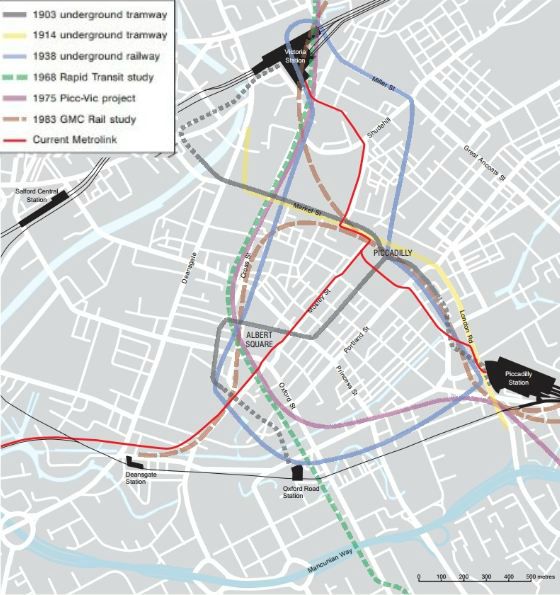Transport experts at the University of Manchester have delved into archives covering the last 100 years to produce a fascinating insight into failed plans to improve the city's infrastructure.
The failed schemes include plans for an Underground network, a monorail and rapid transit connections. Economic factors are thought to have scuppered the ambitious projects.
Dr Martin Dodge, senior lecturer in geography at the university, produced the Tunnels through time research project by gathering information and maps from old transport reports and newspaper articles.
Dr Dodge said: 'For me, what is fascinating is the sense of deja-vu as seemingly every decade or so a 'new' proposal comes forward to solve the problem by a grand engineering endeavour. This utopian quote from a newspaper correspondent, in 1936, echoes down the years: "A judicious policy of suburban railway electrification, coupled with a well-designed tube railway system, would go a long way towards making the population in and around Manchester happier and healthier."
'And yet all the schemes would have been expensive and crucially uneconomic given the shape of the city, the small size of the central zone and the scale of daily passengers. The desire for tube travel for status of a serious city simply could not be afforded through the 20th Century.'
The most developed proposal appears to have been a Picc-Vic tunnel in the late 1960s - an underground railway beneath Manchester Town Hall and station that was defeated by national economic decline in the 1970s.
Dr Dodge highlights the view of influential city surveyor, Rowland Nicholas, in the 1945 City of Manchester Plan, that building an Underground for a population of Manchester’s size would result in financial loss.
This conclusion was mirrored against the backdrop of repeated efforts, Dr Dodge said.

Map of planned schemes from Manchester University